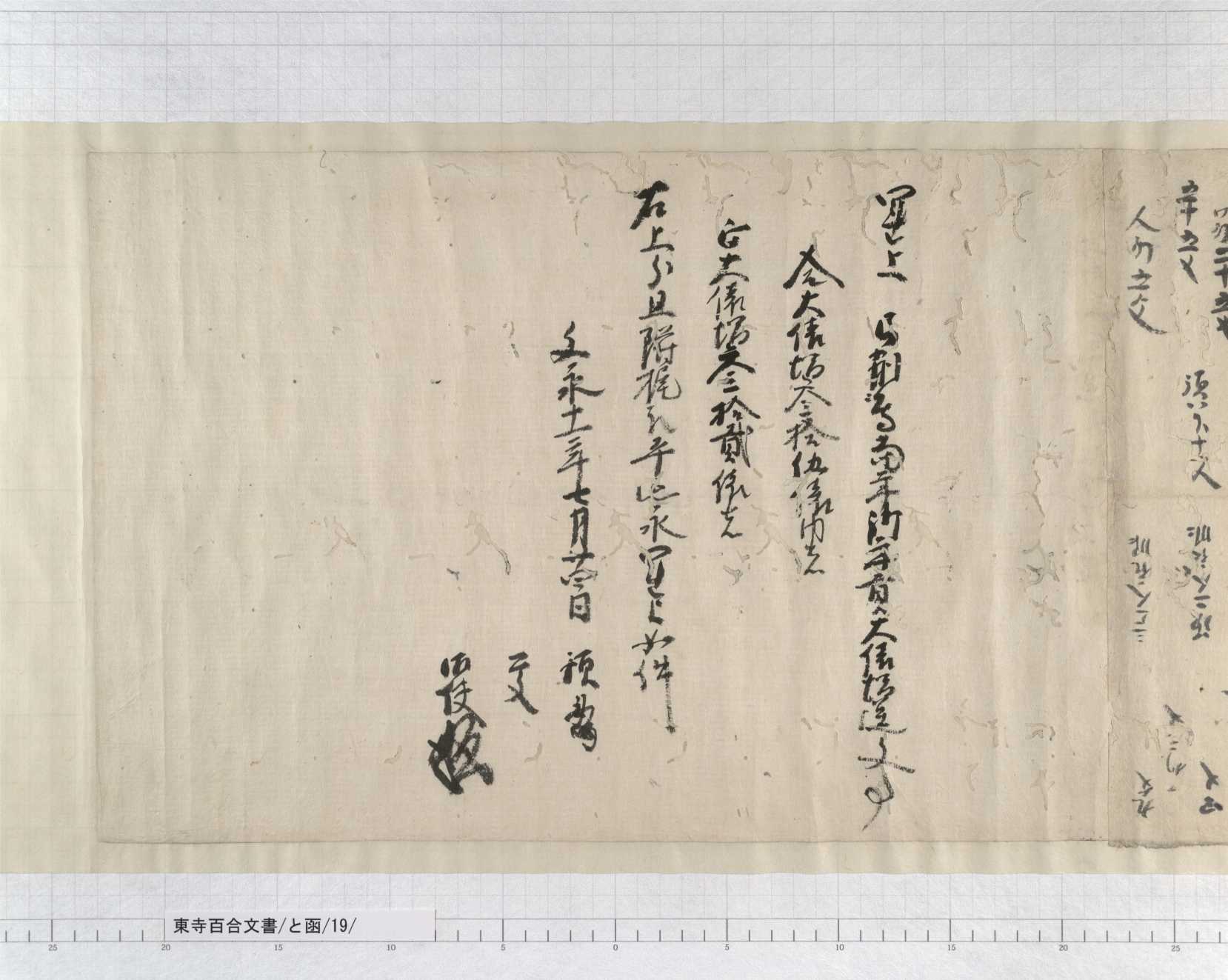What do humans definitely need for living? Water, air, nature, affection, and what else? There may be many others, and one of them is salt.
Salt was indispensable for living, and at the same time has been used for religious services since ancient times, as a sacred matter that has purifying power.
While salt is easily available today, people could not get salt anytime anywhere in older days. Salt was particularly valuable in Kyoto, the metropolis that was located remote from the sea.
The previous story “Sending nice marine products” in the Stories behind the Hyakugo Archives featured land tax delivered from Yugeshima(弓削島), a small island in the Seto Inland Sea(瀬戸内海).
Yugeshimanosho(弓削島荘) was known as a “Shoen (manor) of salt”, and was among the most important manors for the Toji temple, because it delivered large quantities of salt as land tax. Salt was counted by the unit of “hyo (bags)”(俵), just like rice, and was delivered as land tax in place of rice.
The document below is an invoice attached to salt that was sent from Yugeshimanosho to Toji as land tax:

At the end the document is dated “文永十一年七月廿四日 (July 24, 1274)”. On the back of the document, it is added “文永十一 八 廿七 到来御寺納分 (lit. shipment arrived at the temple on August 27, 1274)”. Look at the left end of the picture below:

It seems that the shipment left Yugeshima on July 24, 1274, and safely arrived in Kyoto on August 27, and was successfully delivered to Toji. It took as long as 34 days!
Salt was put on a ship, which traveled across the Seto Inland Sea, went up the Yodogawa river(淀川), and was unloaded in Yodo(淀) (the present Fushimi-ku, Kyoto City), around the borders of Kyoto and Osaka. The shipment was taken over by another carrier after unloading, and was carried to Toji in the central Kyoto. It was a long journey of more than one month, by sea and then by land. It must have been a difficult travel. The routes were not always safe. Especially the sea route was subject to storms, pirate attacks, and many other hazards. Salt as land tax was delivered all the way to Toji, going through one trouble after another.
Some taxpayers were cunning enough to pay land tax in a dishonest manner, or to embezzle a part of tax, using accidents and troubles on the sea route as an excuse.
This was why Toji had manors across Japan submit written oaths to pay land tax honestly. For example, the document below was written by the Azukaridokoro (預所)(local manager) at Shinchokushiden(新勅旨田), a manor of Toji that was located in Akinokuni (the present Hiroshima Prefecture), and submitted to Toji. Land tax was also delivered from this manor to Toji, across the Seto Inland Sea by a ship.

The local manager promised that he would pay the specified land tax honestly, and that he would not protest to water torture or fire torture in the event of breach. What a harsh oath!
The written oath also states that, if an unexpected accident would happen during transportation over the sea route, the local manager would present “顕然之証拠 (lit. obvious evidence)”.
Look at the document below. It is a letter submitted to Toji, presenting “顕然之証拠”, when a ship that was carrying salt as land tax from Yugeshima met a storm.

Let’s look at how the representative of Yugeshima explained what happened:
— A fleet consisting of more than 100 vessels was formulated, loaded with the bags of rice and salt as land tax. The fleet was passing the Seto Inland Sea to deliver the land tax safely to Kyoto. When we came to around the middle of the sea route, in Harimanada(播磨灘) (a sea area in the southwest of the present Hyogo Prefecture), a storm hit us.
Cargo on all other ships was damaged by water. My ship was the only one that did not suffer devastating damage, probably thanks to the protection by Buddha, and we are all happy about this result. However, 12 bags of salt were damaged by water, though more than 100 bags remained safe. This all happened in front of us, and is the truth without any piece of lie. We sincerely beg you to exempt these 12 bags of salt.
Salt is like no other items that were sent as land tax. While other items could be delivered safely even if they got wet, salt was melted and flowed away when wet, making all the efforts of producing and carrying into nothing.
Was this representative’s begging accepted? No document remains that uncovers the result, but we can imagine the troubles and difficulties that were unique to salt.